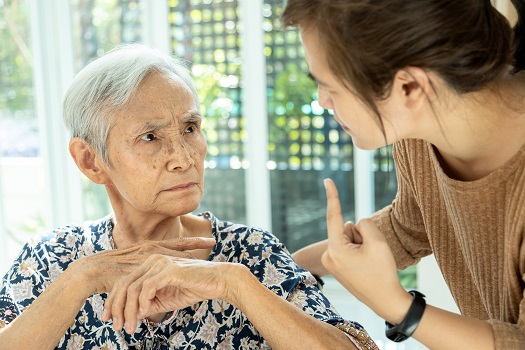During the final stages of Alzheimer’s disease, symptoms typically worsen. Because this is when the brain has already been significantly damaged, it’s not unusual for a senior with this condition to no longer be able to communicate clearly. In fact, talking may stop altogether. This can be heartbreaking and frustrating at the same time, but there are steps you can take when your senior parent with Alzheimer’s stops talking.
1. Establish Eye Contact
Just because your parent can no longer talk doesn’t mean he or she can’t understand what you’re trying to convey. It may be easier for your loved one to do this when you have his or her full attention. Look your loved one directly in the eye so he or she can focus as you speak.
A professional caregiver with training and experience in Alzheimer’s care can be a wonderful source of support for seniors and their families. If your senior loved one has been diagnosed with a serious condition and needs help with tasks like meal prep, transportation, bathing, and grooming, reach out to Home Care Assistance, a leading provider of at-home care families can trust. We also offer comprehensive care for seniors with dementia, Alzheimer’s, and Parkinson’s.
2. Look for Visual Cues
A senior with Alzheimer’s who’s no longer talking is often still able to convey emotions and feelings with body language. Pay close attention to physical indicators that suggest how your parent is feeling. Some of these include:
• Facial expressions
• Body positions
• Shoulder shrugs
• Hand gestures or movements
3. Be Aware of Signs of Discomfort
Not talking means your parent may have difficulty letting you know if he or she is experiencing discomfort. A good indicator of discomfort is sudden changes in behavior that seem out of the ordinary. For instance, your parent may suddenly push you away when you try to feed him or her if he or she has a gum infection or an irritated throat. If you’re regularly seeing nonverbal signs of discomfort, schedule an appointment with your parent’s doctor to determine if there’s anything that needs to be addressed.
Caring for a senior loved one can be challenging for families who don’t have expertise or professional training in home care, but this challenge doesn’t have to be faced alone. Family caregivers can turn to Anchorage Home Care Assistance for the help they need. We provide high-quality live-in and respite care as well as comprehensive Alzheimer’s, dementia, stroke, and Parkinson’s care.
4. Continue Talking to Your Parent
Even when your parent can no longer talk or verbally respond, it’s still important to keep talking to him or her. Oftentimes, the tone of your voice can be comforting and reassuring. You can even use this to your advantage when providing care. For instance, you might remind your parent about favorite memories or talk about what’s going on in your life while helping with daily tasks like bathing and dressing. What this can do is keep your parent calm while also allowing you to connect with him or her.
On a related note, avoid the temptation to talk about your parent with someone else in the same room as if your parent isn’t there. People in the later stages of Alzheimer’s often become confused or agitated easily. Plus, it’s more respectful to try to include your loved one in conversations he or she may be able to hear.
5. Experiment with Other Communication Techniques
People with Alzheimer’s who are no longer capable of verbal expression may still be able to indicate what they prefer, need, and want. Because everyone with this condition is different, do some experimenting with your parent to see what methods of communication may be effective. Possibilities include:
• Using flashcards with pictures of common needs or expressions your parent can point to
• Asking simple “yes” or “no” questions that can be answered with a head nod or turn
• Using gentle touches to convey love and other pleasant emotions
Recovering from a stroke, managing the symptoms of Alzheimer’s, and a variety of other health-related situations can make it difficult for a senior to continue living at home without someone there to help. Anchorage, AK, live-in care professionals are trained to help seniors who need 24/7 assistance. With the help of a live-in caregiver, your elderly loved one can maintain a higher quality of life while aging in place. Trust your loved one’s care to the professionals at Home Care Assistance. To create a customized home care plan for your loved one, call (907) 770-0907 today.
